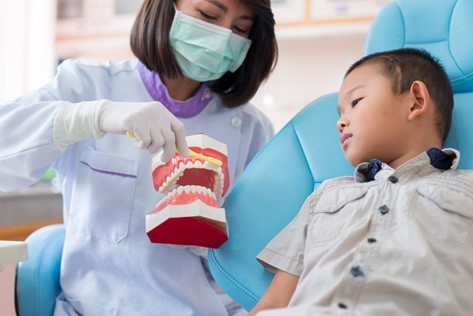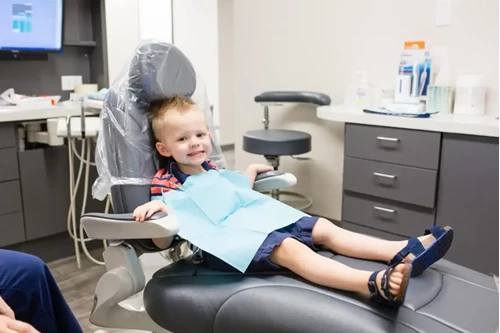When To See A Pediatric Dentist And What To Expect During The First Visit
When it comes to children’s dental care, it’s important to choose a provider who has the specialised training and expertise to meet their unique needs. That’s where a paediatric dentist comes in. However, not all parents or caregivers realise that dental care for children should start at the early stage of development.
Ideally, a routine dental appointment should be scheduled within 6 months of the eruption of the baby’s first tooth or by age one. This ensures a paediatric dentist can assess the child’s mouth at a young age and intervene if any problems are found. Let’s consider the role of this specialist, also known as a pedodontist, and how a typical visit might play out.
Who Are Paediatric Dentists?
Paediatric dentists are the primary care for the dental needs of infants and young children. These are professionals who have completed additional training and education in the care of children’s teeth, gums, and mouths. They are equipped to handle the unique challenges and concerns that arise during childhood, from teething to thumb sucking, tooth sensitivity to cavities, and everything in between.
In addition, they understand the importance of building trust and establishing a positive relationship with children and their parents or caregivers, which can make all the difference in their dental care experience.

What Dental Conditions Demand Seeing a Paediatric Dentist?
The needs of children vary greatly depending on their age. Feeding problems during the first year of their life may be related to tongue or lip ties. Dental problems typically develop after the first year. As they get older, their teeth and gums tend to develop more serious conditions, especially in the absence of proper oral hygiene. That includes:
- Gum disease
- Cavities
- Early childhood caries (ECC)
- Malocclusion
- Tooth injury
- Tooth decay
Some of these conditions are prevalent. For instance, it is estimated that 42% of children between the ages of 2 and 11 have had cavities in their primary (baby) teeth, and 21% of children between the ages of 6 and 11 have had cavities in their permanent teeth. A similar trend is seen in early childhood caries (ECC), where 28% of children between ages 2 and 5 are affected.

What Services Does a Paediatric Dentist Provide?
A paediatric dentist can work with children of all ages to preserve their oral health and give them a healthy smile for life. Their expertise encompasses all aspects of dental care, such as:
- Preventive care: Regular cleanings, fluoride treatments, and sealants to help prevent cavities and gum disease.
- Restorative care: Fillings, crowns, and other treatments to repair teeth that have been damaged by decay, trauma, or other factors.
- Orthodontic care: Braces, retainers, and other appliances to correct misaligned teeth and jaws.
- Emergency care: Treatment for dental injuries and other urgent dental issues.
- Oral surgery: Extractions and other procedures to remove teeth or repair damaged tissue. Tongue and Lip tie releases.
- Special needs care: Treatment for children with disabilities, developmental delays, or other special needs.
- Education and counseling: This includes providing patients and their families with information on how to maintain good oral health and prevent dental problems.
When to Visit a Paediatric Dentist
Parents ought to take their children to see a paediatric dentist within 6 months of the eruption of their first tooth or by age 1. Early examinations are recommended to detect any oral health problems and begin treatment immediately. Following that, regular visits should be made every 6 months, except when these symptoms are present:
- Toothache or any type of pain in the mouth
- Broken or chipped tooth
- Bleeding gums when brushing
- Swollen, red, or tender gums
- Mouth sores that don’t heal
- Yellow or brown spots on the teeth or inside the mouth
What to Expect During the First Visit to a Paediatric Dental Clinic
Dental History
The dentist will ask about the child’s dental history, including any previous dental visits, any dental problems or concerns, and current oral hygiene habits.
Thorough Oral Examination
It is not enough to determine the type of treatment for a dental condition using only the paediatric patient’s dental records. The pedodontist will need to examine the child’s teeth and gums, looking for any signs of tooth decay or other dental problems.
An X-ray or panoramic radiograph can also be taken to see how the teeth and supporting bone are developing.

Cleaning and Sanitisation
The teeth and mouth will be thoroughly cleaned and polished. If there is an calculus build-up, the dentist or hygienist will use a scaler or cavitron to remove any hard build-up.
Pain Relief and Sedation
If dental treatment is needed, a local an aesthetic, which numbs the mouth, can be applied to prevent pain during the procedure. Children with severe dental anxiety can be given a sedative to help them relax and feel calm.
Main Treatment
At this stage, the paediatric dentist can proceed with the treatment plan recommended by the first examination, which may be extracting the decayed tooth, filling in a cavity, and applying a sealant. Post-treatment instructions and next-appointment scheduling may also be provided.
How to Find the Right Paediatric Dentist
Here are some tips to help any parent or carer find the best pedodontist in a given locality.
Ask for Recommendations
Paediatricians or other healthcare providers can prove resourceful in pointing clients in the right direction when it comes to paediatric dentists. Some may even be affiliated with the recommended provider. In addition, friends, family, and other parents may be very helpful.
Research the Dentist’s Credentials
Look for a dentist who is board-certified by the American Board of Paediatric Dentistry (ABPD). This means that the dentist has completed a specialised training program in paediatric dentistry and has passed rigorous exams.
Consider the Dentist’s Location and Office Hours
The dentist should be accessible and open at times that are convenient for both parents and children. For example, some paediatric dental offices offer early morning, late afternoon, and Saturday hours.

Find a Dentist with Experience Treating Children
Look for a dentist with a lot of experience working with children. Also, one who has had success treating kids with developmental delays, physical disabilities, and other special needs.
Compare Charges and Treatment Plans
When choosing a paediatric dentist, it’s important to compare the costs and treatment plans available at different facilities. This way, clients can choose the one that best suits their budget and their children’s needs.
Conclusion
As noted above, parents and carers need to start their children onward on the road to good oral health early on. This requires the services of a paediatric dentist who has the right training and experience to manage all their oral health needs, from routine preventive care to full-blown tooth extraction. In the right hands, a visit to the dentist can be a fun and even rewarding experience.